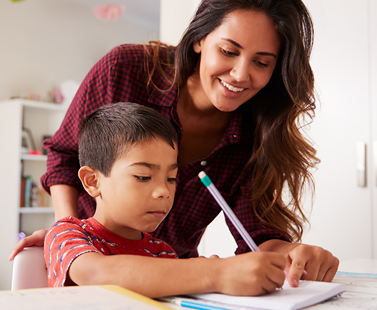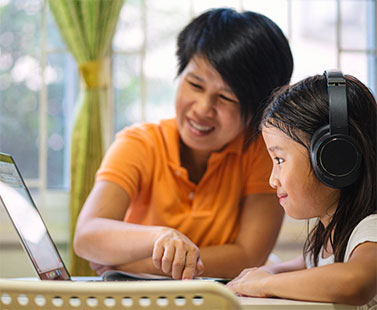Family Engagement

1) How can I welcome and engage families of Multilingual Learners as active partners in their child’s learning?
Families have a wealth of knowledge to share, particularly about their language, culture, home life, and of course, their child.16 Research shows that strong home-school connections are related to positive learning and developmental outcomes for children from diverse backgrounds.17 Families play a critical role in helping to maintain the home language and culture for their children. Such an environment promotes children’s identity development, along with the other advantages of bilingualism, biliteracy, and biculturalism.18 By partnering and engaging in two-way communication, teachers and families can share information and learn with and from each other. Within the classroom, teachers should integrate families’ language and culture in the learning.19 In turn, teachers help children make connections between their experiences in the home, school, and community to provide early learning experiences that best meet their needs.20 Communication with families should be frequent, ongoing, and responsive to families’ needs, even if you do not speak the home language.
Sample Lesson Plan & Resource Walk
Access additional resources developed to introduce teachers to the work of family engagement. These activities, a sample lesson plan and a resource walk, are designed to support learning about this instructional topic area through structured exploration of resources on the website. Click the buttons below to access these resources.
Strategies in action



You can search across all strategies by keyword on our Research Search page. Give it a try!
Evidence-Based Strategies and Resources
1A) Gather information on each child’s language/cultural background from parents upon enrollment.*
Video & Video Guide
Video & Video Guide: Family Languages and Interests Interview
TK
10-15 minutes
Video & Video Guide
Video & Video Guide: Family Languages and Interests Interview (Spanish)
TK
5-10 minutes
Downloadable template
Template: Family Languages and Interests Interview Form
TK
Under 5 minutes
Downloadable template
Template: Family Languages and Interests Interview Form (Spanish)
TK
Under 5 minutes
TK
10-15 minutes
TK
More than 60 minutes
Document
Tip Sheet: Gathering and Using Language Information That Families Share
TK
10-15 minutes
Website
Website: Supporting Dual Language Learners through Family Support
TK
5-10 minutes
Other
Guide: The Family Partnership Process – Engaging and Goal-Setting with Families
TK
30-60 minutes
TK
5-10 minutes
1B) Talk with families about their language and learning goals for their child. Ask families to share their thoughts on the child’s bilingual development and how this may relate to their goals.
Downloadable template
Template: Family Languages and Interests Interview Form
TK
Under 5 minutes
Video & Video Guide
Video & Video Guide: Family Languages and Interests Interview (Spanish)
TK
5-10 minutes
Downloadable template
Template: Family Languages and Interests Interview Form (Spanish)
TK
Under 5 minutes
TK
10-15 minutes
TK
15-30 minutes
TK
10-15 minutes
Document
TK
15-30 minutes
Website
Website: Supporting Dual Language Learners through Family Support
TK
5-10 minutes
Document
Tip Sheet: Gathering and Using Language Information That Families Share
TK
10-15 minutes
Other
Guide: The Family Partnership Process – Engaging and Goal-Setting with Families
TK
30-60 minutes
TK
More than 60 minutes
Video & Video Guide
Video & Video Guide: Family Languages and Interests Interview
TK
10-15 minutes
TK
10-15 minutes
TK
10-15 minutes
Document
Resource Guide: FAQ Guide for Program Directors and Administrators
TK
10-15 minutes
1C) Provide families with information on home language development and the benefits of bilingualism and encourage them to continue to speak their home language to their children.
Document
Policy Brief: PreK-3rd Challenging Common Myths about Dual Language Learning
TK
More than 60 minutes
Video
Webinar: Exploration of Myths and Facts Regarding Dual Language Learners
TK
15-30 minutes
TK
5-10 minutes
TK
5-10 minutes
TK
10-15 minutes
TK
Under 5 minutes
TK
15-30 minutes
TK
10-15 minutes
TK
10-15 minutes
Document
TK
15-30 minutes
Document
Flyer: How Families Can Develop Oral Language/Como familias pueden desarrollar lenguaje oral
TK
Under 5 minutes
TK
5-10 minutes
TK
5-10 minutes
TK
10-15 minutes
TK
10-15 minutes
TK
Under 5 minutes
1D) Partner with families to provide varied opportunities for them to come to the classroom to share their language and culture.
Document
Tip Sheet: Parent Involvement and Family Engagement for Early Childhood Professionals
TK
Under 5 minutes
TK
Under 5 minutes
TK
10-15 minutes
TK
Under 5 minutes
TK
15-30 minutes
TK
15-30 minutes
Other
TK
10-15 minutes
Document
Tip Sheet: Early Learning and School Readiness – Social and Emotional Development
TK
5-10 minutes
Document
Tip Sheet: Early Learning and School Readiness – Social and Emotional Development (Arabic)
TK
5-10 minutes
Document
Tip Sheet: Early Learning and School Readiness – Social and Emotional Development (Spanish)
TK
5-10 minutes
Document
Tip Sheet: Early Learning and School Readiness – Language and Literacy Development (Spanish)
TK
5-10 minutes
Document
Tip Sheet: Early Learning and School Readiness – Language and Literacy Development
TK
5-10 minutes
TK
15-30 minutes
TK
5-10 minutes
Document
Resource Guide: FAQ Guide for Program Directors and Administrators
TK
10-15 minutes
1E) Provide parents with children’s learning activities to support home language development and connect the curriculum with learning at home.
TK
Under 5 minutes
TK
10-15 minutes
TK
Under 5 minutes
10-15 minutes
Document
Flyer: How Families Can Develop Oral Language/Como familias pueden desarrollar lenguaje oral
TK
Under 5 minutes
TK
5-10 minutes
TK
10-15 minutes
TK
10-15 minutes
Document
Tip Sheet: Early Learning and School Readiness – Language and Literacy Development
TK
5-10 minutes
Document
Tip Sheet: Early Learning and School Readiness – Language and Literacy Development (Spanish)
TK
5-10 minutes
Document
Tip Sheet: Early Learning and School Readiness – Approaches to Learning
TK
5-10 minutes
Document
Tip Sheet: Early Learning and School Readiness – Approaches to Learning (Arabic)
TK
5-10 minutes
Document
Tip Sheet: Early Learning and School Readiness – Approaches to Learning (Spanish)
TK
5-10 minutes
TK
Under 5 minutes
Document
Tip Sheet: How to Support Your Child’s Social-Emotional Health – 8 Tips (in 16 languages)
TK
5-10 minutes
TK
5-10 minutes
Document
Tip Sheet: Parent Involvement and Family Engagement for Early Childhood Professionals
TK
Under 5 minutes
TK
Under 5 minutes
TK
Under 5 minutes
TK
Under 5 minutes
Document
Resource Guide: FAQ Guide for Program Directors and Administrators
TK
10-15 minutes
TK
30-60 minutes
1F) Partner with families in identifying topics or ideas that are of interest to the child and incorporate these in curriculum planning.
10-15 minutes
TK
15-30 minutes
TK
15-30 minutes
Other
TK
10-15 minutes
Document
Tip Sheet: Early Learning and School Readiness – Social and Emotional Development
TK
5-10 minutes
Document
Tip Sheet: Early Learning and School Readiness – Social and Emotional Development (Arabic)
TK
5-10 minutes
Document
Tip Sheet: Early Learning and School Readiness – Social and Emotional Development (Spanish)
TK
5-10 minutes
Document
Tip Sheet: Early Learning and School Readiness – Language and Literacy Development
TK
5-10 minutes
Document
Tip Sheet: Early Learning and School Readiness – Language and Literacy Development (Spanish)
TK
5-10 minutes
Document
Tip Sheet: Early Learning and School Readiness – Approaches to Learning
TK
5-10 minutes
Document
Tip Sheet: Early Learning and School Readiness – Approaches to Learning (Arabic)
TK
5-10 minutes
Document
Tip Sheet: Early Learning and School Readiness – Approaches to Learning (Spanish)
TK
5-10 minutes
TK
15-30 minutes
Document
Tip Sheet: Parent Involvement and Family Engagement for Early Childhood Professionals
TK
Under 5 minutes
*Note: When collecting information from families, gather information that will be helpful for informing instruction. Avoid questions that may be sensitive, such as those concerning citizenship or immigration status, which should not have implications for a child’s access to free public education (see CDE description of immigration status of students) and their right to feel safe and secure at school (as described in Assembly Bill No. 699).

Strategies are interrelated
Individual strategies across the different instructional topics are interconnected and should be implemented together, in a purposeful and connected manner throughout instruction, and not in isolation. Make sure to also consider your classroom or school’s language model when implementing the strategies and adapt accordingly.
Visit how to use this site >

Alignment with Existing California Educator Guidance Documents & Resources
The Multilingual Learning strategies are closely aligned with existing guidance documents and resources for educators in California. Learn how Family Engagement strategies align with these existing resources, or to see how the standards align across all strategies, visit the alignment reference guide page.

